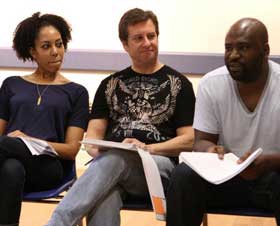The Project Lifecycle
 We at Tilted Barn believe that by following our project lifecycle methodology, we can maintain the highest standards of excellence and production quality while fully developing and nurturing artistic expressions. We really do cultivate creativity, and here’s how.
We at Tilted Barn believe that by following our project lifecycle methodology, we can maintain the highest standards of excellence and production quality while fully developing and nurturing artistic expressions. We really do cultivate creativity, and here’s how.
Phase One – Seedlings – Getting Things Started
 At Tilted Barn, we approach your projects in exactly the same manner we approach our own. Every project starts with a kick-off meeting made up of all relevant parties (we may even meet in the barn). We will handle all aspects of coordination, communication, and administration of the meeting. The objective of the kick-off is to align everyone with a common set of goals and objectives, thereby creating the seeds of the project.
At Tilted Barn, we approach your projects in exactly the same manner we approach our own. Every project starts with a kick-off meeting made up of all relevant parties (we may even meet in the barn). We will handle all aspects of coordination, communication, and administration of the meeting. The objective of the kick-off is to align everyone with a common set of goals and objectives, thereby creating the seeds of the project.
From there the next three key deliverables will be the detailed project plan, budget, and identification of the extended team. With all that in place, we feel we have fully prepared the soil, chosen the best seeds, and your project will be planted and ready to move on to phase two.
Phase Two – Growth – Making Things Happen
 This is the most timely and difficult part of any project and one that needs to be tended to with extreme care, professionalism and attention to detail. There are many factors that come into play to ensure a strong and healthy growth. We have found that the best way to mitigate risk, is to have frequent “check-in” meetings and constantly monitor growth against our initial plan.
This is the most timely and difficult part of any project and one that needs to be tended to with extreme care, professionalism and attention to detail. There are many factors that come into play to ensure a strong and healthy growth. We have found that the best way to mitigate risk, is to have frequent “check-in” meetings and constantly monitor growth against our initial plan.
The bulk of this phase is made up of all of the typical pre-production activities found with any project (funding, crewing up, locations, contracts, casting, wardrobe, equipment, set design, etc.). This phase also includes the actual production of the project. In the case of a film project, this phase concludes after the final shot and it’s all “in the can.” In the case of a theatre project, this phase concludes with the final curtain call. For smaller projects, this phase concludes with a hand-off of our completed deliverables.*
Phase Three – Harvest – Competed Projects
 The final phase of the project largely depends on the nature of the project. For most film related projects, the typical post-production activities will include editing, sound engineering, color correction, ADR, music, preparation for festival submissions, distribution, and/or pitch preparation, etc. For theatre productions, this phase largely involves the preparation and presentation of all publicity and press related to the production to an on-line source to further promote the players and the play.
The final phase of the project largely depends on the nature of the project. For most film related projects, the typical post-production activities will include editing, sound engineering, color correction, ADR, music, preparation for festival submissions, distribution, and/or pitch preparation, etc. For theatre productions, this phase largely involves the preparation and presentation of all publicity and press related to the production to an on-line source to further promote the players and the play.
Regardless of the project, once “It’s a wrap”, your project will be publicized and promoted on our Tilted Barn website with links to any of our clients own on-line venues.
